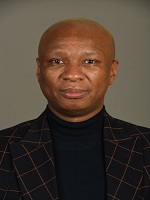Download your Magazine copy here
Zizi Kodwa, the former South African Minister of Sports, Arts and Culture, is embroiled in a significant legal battle that has captivated national attention. Kodwa, a prominent figure in South African politics, faces multiple allegations of corruption and misconduct during his tenure in office. These charges have not only tarnished his reputation but also raised questions about the integrity of the government institutions he once served. Kodwa’s political career has been marked by his rise through the ranks of the African National Congress (ANC), where he held various influential positions before being appointed as Minister of Sports, Arts and Culture. His tenure was expected to bring about substantial reforms and improvements within these sectors. However, recent allegations have overshadowed his contributions and led to a complex legal predicament.
The Charges
The case against Kodwa primarily revolves around accusations of accepting bribes and engaging in corrupt activities to influence government contracts
and appointments. These allegations surfaced following an extensive investigation by the Special Investigating Unit (SIU), which uncovered evidence suggesting that Kodwa had exploited his position for personal gain. The charges include:
- Bribery: Allegations of receiving substantial sums of money from business entities in exchange for awarding lucrative government contracts.
- Misuse of Office: Accusations of leveraging his ministerial position to favor certain individuals and companies, compromising the fairness and transparency of the procurement process.
- Financial Misconduct: Evidence suggesting improper financial dealings and irregularities in the management of public funds allocated to the Department of Sports, Arts and Culture. Amidst the ongoing investigation, Zizi Kodwa was arrested and subsequently released on bail. His bail conditions include strict monitoring and restrictions on his movements, aimed at ensuring that he does not interfere with the ongoing legal processes. The decision to grant bail was met with mixed reactions, with some arguing that it undermines the severity of the charges, while others believe in the principle of presumption of innocence until proven guilty.
Kodwa’s decision to resign from his ministerial position has sparked widespread speculation and debate. His resignation came shortly after the formal charges were announced, leading many to question the timing and motivations behind this move. There are several possible reasons for his sudden change of heart:
- Political Pressure: It is plausible that increasing political pressure from both within the ANC and the broader public sphere influenced his decision. Maintaining his position amidst such serious allegations would have undoubtedly affected the credibility of the ANC and the government.
- Legal Strategy: Resigning may also be part of a broader legal strategy advised by his legal team aimed at mitigating the potential impact of the charges on his defense. By stepping down, he could distance himself from the office and reduce accusations of using his position to obstruct justice.
- Public Perception: Given the high-profile nature of the case, resigning could be an attempt to manage public perception and demonstrate accountability, even if he maintains his innocence. Additional Cases Following the initial charges, further investigations have revealed additional cases implicating Kodwa
in other corrupt activities during his tenure. These new revelations include: - Further Bribery Allegations: More instances of alleged bribery have emerged, involving different entities and larger sums of money. These cases indicate a potentially broader pattern of corruption beyond the initial charges.
- Abuse of Power: Additional accusations of abusing his ministerial power to influence decisions in various cultural and sports projects. These include allegations of unfairly distributing funds to organizations with personal ties to him.
